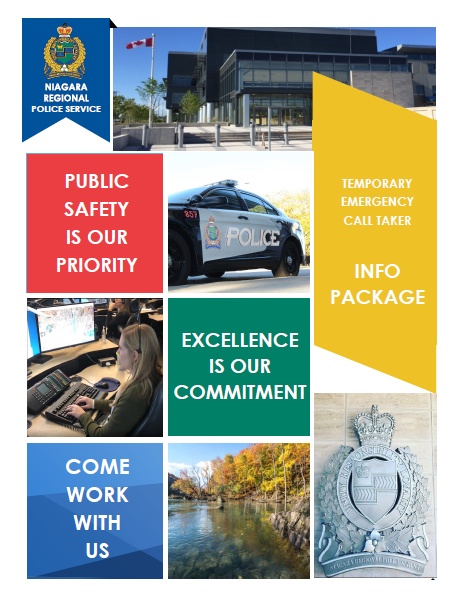- All Communicators begin as Temporary Emergency Call Takers.
- Temporary Emergency Call Takers provide support to the Communications Unit by filling in for full-time Emergency Call Takers during periods of temporary absence (i.e., vacation, illness, etc.).
- Whereas full-time Emergency Call Takers are assigned to a Platoon and work a 4 day x 12 hour shift work schedule, Temporary Emergency Call Takers are assigned shifts and hours as needed to cover Unit vacancies.
Communications Unit Opportunities
Join Our Team
- Respond to emergency 9-1-1 and non-emergency callsfor assistance and information via the telephone or othermandated communication medium.
- Provide timely service, being a critical first contact betweenthe public and emergency services which includes police, fire ormedical intervention.
- Assess, prioritize and input critical information into thecomputer aided dispatch program and transfer calls toappropriate emergency response agencies as required.
- Must remain calm, composed and be able to takecontrol of a situation that may be chaotic, heart-wrenching,stressful, and confusing.
We are always looking for qualified candidates to fill Emergency Call Taker Positions.
For more information about the Emergency Call Taker position, please download the booklet below.
Download the Emergency Call Taker Info Package
 | If you are interested in learning more about starting a career as an Emergency Call Taker please click here to download the package. Includes:
|
Take The Self Assessment
Are you considering starting a meaningful career with us at the Niagara Regional Police Service Communications Centre? Take the self-assessment to find out.
| Am I able to... | ||
|---|---|---|
| YES | NO | Work and learn in a fast-paced and ever-changing work |
| YES | NO | Learn in a variety of settings (classroom, one-on-one coaching, online, etc.)? |
| YES | NO | Quickly grasp and comprehend training materials and proceduralinformation? |
| YES | NO | Interact in a professional and calm manner, even under pressure? |
| YES | NO | Maintain a high level of professionalism, both on and off duty? |
| YES | NO | Work collaboratively and productively with coworkers andsuperiors? |
| YES | NO | Operate within a paramilitary working environment (i.e. takedirections from your superiors in front of coworkers)? |
| YES | NO | Work in an office environment with scheduled breaks? |
| YES | NO | Gain a sense of satisfaction from keeping our community safe? |
| YES | NO | Work rotating shifts (days, evenings, nights), including weekendsand holidays; potentially missing personal/family events? |
| YES | NO | Commit to deliver excellent service to the public? |
| YES | NO | Emotionally disengage in order to complete my tasks when dealingwith situations involving suffering, tragedy, and otheremergencies? |
| YES | NO | Solve problems under pressure? |
| YES | NO | Assess my strengths and weaknesses and seek opportunities forself-improvement? |
| YES | NO | Do my ordinary duties extraordinarily well with competence,commitment, and compassion? |
| Do I have... | ||
|---|---|---|
| YES | NO | Critical thinking abilities and excellent multi-tasking skills? |
| YES | NO | A strong support system for debriefing and emotional support? |
| YES | NO | Self-care strategies to maintain work-life balance? |
| YES | NO | The support of my family to commit the time required studying numerousmaterials during the training process? |
| YES | NO | The ability to concentrate, read, and comprehend training materials required to be successful in the training process? |
| YES | NO | The self-confidence to be assertive when the situation demands it? |
Emergency Call Taker FAQ
One of the most frequent questions asked about the role is what exactly does temporary mean?
Is this a contract position? For example, renewed every 6 months?
- No, this is not a contract position. As long as you are meeting training benchmarks, Service expectations, remain available, and perform well in the role, you will continue to receive hours.
How many hours will you receive as a Temporary Emergency Call Taker?
- The Service puts a great deal of resources into Emergency Call Taker trainees – approximately 3 months of training initially (one month in class and 2 months live training on the floor) followed by another 3-4 months of dispatch training after at least 6 months of call taking.
- After making a significant training investment, the goal is to ensure that your skill set is maintained, by providing you with sufficient hours to ensure you do that.
- Although hours are not guaranteed, most Temporary Emergency Call Takers work at least 24 hours per week and increase to 44 hours per week during peak vacation times (May – September and December).
Is there ever any chance to work overtime?
- There are at times opportunities for overtime – particularly in the summer months.
How long does it take to attain a full-time position?
- Temporary Emergency Call Takers are eligible to apply for any posted full-time civilian position from their first day of employment with the Service.
- Attaining full-time employment varies as it is subject to vacancies within the Unit/Service and ensuring that NRPS internal job posting policies and procedures are followed.
Be a part of something great.
Join us and answer the call to serve our community.
If you have questions, or to learn more about this position, EmailCareers@niagarapolice.ca.
